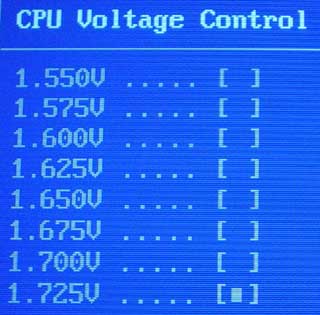Intel announces DDR333 Chipsets: 3-way 845PE shootout
by Evan Lieb on October 7, 2002 5:22 AM EST- Posted in
- Motherboards
Gigabyte 8PE667 Ultra: BIOS and Overclocking
We see that Gigabyte decided to choose the Award BIOS for their 845PE-based 8PE667 Ultra motherboard.

There's lots of good information hidden within the PC Health section of the 8PE667 Ultra's BIOS. Here you'll find readings on Vcore, CPU temperature, PSU readings (all rails), and CPU, Power and System Fan speed readings. There are also options for enabling a CPU warning temperature, CPU fan failure warning, power fan failure warning, and system fan failure warning.

Gigabyte didn't go all out and provide a lot of DRAM tweaking options in the Advanced Chipset Features section, but your choices are pretty good (in case you forgot, you have to hold the CTRL key and press F1 to bring up the Advanced Chipset Features section). You're able to adjust CAS Latency, Precharge to Active, Active to Precharge, and Active to CMD. Just like the Albatron PX845PEV Pro motherboard, there are no options for enabling Fast, Turbo or Ultra mode, and there are no Command Rate or Bank Interleave adjustments either. This is unfortunate in a way, because we would have liked to have used bank interleave, command rate, and timing mode settings for our stress testing.

Gigabyte offers some pretty hefty FSB adjustments in the BIOS; the BIOS allows an adjustable FSB up to 355MHz. This is even more overkill than the previous two 845PE motherboards. There are only two DRAM:CPU ratios available, 2.0X and 2.5X. Unfortunately, due to the limited ratio options, we were unable to overclock the memory for our usual round of stress tests, as we ran into issues with overclocking the FSB too far.

The voltage tweaking options available for the Gigabyte 8PE667 Pro motherboard are pretty good, except for Vcore. Although it's usually not a good idea to up the voltage of any Pentium 4 Northwood processor past 1.75V, hardcore overclockers won't like the fact that the BIOS allows on more than 1.725V. In actuality, this figure is even lower; when set to default core voltage (1.5V), the actual Vcore as read through the PC Health section is more like 1.47-1.48V. Therefore, your Vcore ceiling is more like 1.69-1.7V. There were no overvolting jumpers anywhere on the motherboard that would allow anything higher by the way.
Those who like to push their memory as high as possible won't be too discouraged by the fact that VDIMM is adjustable up to 2.7V. Although not always necessary, upping voltage to get a good memory overclock does help sometimes. AGP voltage is also adjustable, all the way up to 1.8V in 0.1 increments in fact. Some video card overclockers will probably take notice of this feature.

The Gigabyte 8PE667 Ultra, like its 845PE-based ASUS and Albatron counterparts, employs an AGP/PCI lock at 66MHz/33MHz. This is adjustable all the way up to 50MHz/100MHz, which will more than likely kill your AGP and PCI cards. For extreme overclockers, an AGP/PCI lock is a very welcome feature; it's never fun to run your AGP or PCI card too far out of spec.
The Gigabyte 8PE667 Ultra overclocked very well. The following table lists the components we used for overclocking the FSB:
|
Front Side Bus Overclocking Testbed |
|
|
Processor:
|
Pentium
4 2.26GHz
|
|
CPU
Vcore:
|
1.5V
(actual)
|
|
Cooling:
|
Intel
Retail HSF & Thermal Pad
|
|
Power
Supply:
|
Enermax
300W
|
Using this setup, we were able to hit 163MHz FSB, just a few hairs below what the Albatron board was able to achieve. This is well over a 500MHz overclock, nearly 2.8GHz core clock speed. Again, this isn't anything too surprising to see out of an 845-based motherboard.
We weren't able to do any extreme memory overclocking with this board due to its limited BIOS ratios (which forced us to halt memory overclocking once we were unable to sustain system stability past 163MHz FSB). However, it should be noted that this motherboard was still able to hit 415MHz (1 DIMM) while the FSB was at 163MHz. In the stress testing section, we'll get into exactly how we determined these settings were stable.










0 Comments
View All Comments